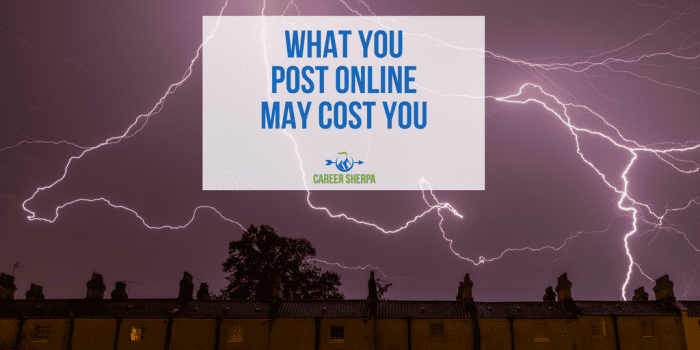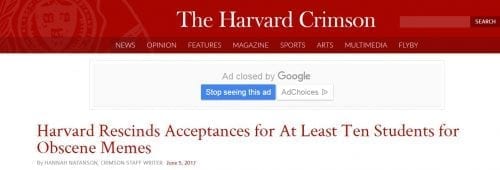Parents, students, politicians…take note. Anything you post online could cost you your future!
AND even more importantly- please be a decent, kind human being!
There are consequences to what you post on social media sites. Whether it is tarnishing your credibility, losing a job, or rescinded admissions into college.
I hope that this post heightens your awareness of the severe repercussions and helps you educate your family and friends.
Post Memes Online At Your Own Risk
Read this headline from The Harvard Crimson:
Harvard Rescinds Acceptances for At Least Ten Students for Obscene Memes
No matter where you stand on free speech, you can’t overlook the impact exercising this right can have on your current reputation or future opportunities. Another way of saying this is, right or wrong, people base decisions on what you post online.
What Happened
In case you missed this news, here’s what happened.
Students admitted into Harvard didn’t post memes on Harvard’s Facebook group. They weren’t that clueless about the dangers of their actions. But that didn’t matter. Here’s the timeline and what got them in trouble.
Admitted students were invited to join the official Admissions Facebook page. A page run and monitored by Harvard.
Early December 2016: From this official group, a new group of about 100 students was independently formed. This group was designed for students to share memes about “popular culture.”
Late December 2016: And then, another private group was formed called (at one time) Harvard memes for horny bourgeois teens, In order to join this private group, admitted students had to earn membership by sharing a meme in the aforementioned private group.
April: Harvard Admissions got wind of this group and emailed members to submit an explanation of their actions for discussion with the Admissions Committee.
End of April: Letters sent to 10 students rescinding offers of admission.
Warning
Harvard covered their bases and warned students in their Facebook group. As reported in The Harvard Crimson, there were warnings and disclaimers.
The Harvard 2021 Facebook group warned:
“As a reminder, Harvard College reserves the right to withdraw an offer of admission under various conditions including if an admitted student engages in behavior that brings into question his or her honesty, maturity, or moral character,” the description reads.
So what exactly does “behavior that brings into question honesty, maturity and moral character” mean? Some say it isn’t clear.
Apparently, the memes which resulted in 10 students losing a place at Harvard included “jokes about the Holocaust, pedophilia, suicide, racism, school shootings, and bestiality.”
What is the moral character of someone that would post jokes on these topics? Would you want to work with someone who shared those types of jokes privately? Do you think it seeps into how they interact in the workplace or how they conduct themselves? Apparently, Harvard believed moral character and maturity of these students was questionable.
As a private institution, Harvard doesn’t need to comply with First Amendment laws. But are those jokes protected by the First Amendment? Should they be? Or is this issue a matter of judgment?
PERSONAL ACCOUNTABILITY
You can say these students shouldn’t be punished for the actions they took in private. But, their actions weren’t done in private. They were taken on a “private” Facebook group. Nothing published online is ever truly private.
Here are some reminders:
- Everyone is entitled to their opinions. However, you will be judged based on what you say and how you say it.
- Any comment you post to a public group on Facebook is visible to anyone. Granted, they may have to search for it, but they can your comments by searching within a group.
- There are also closed groups and secret (private) groups. To join a closed group, the administrator has to accept your request to join. A secret group also requires administrator acceptance. Posts made in closed groups are only visible to current members of the group. So it’s important to know who else is in the groups you join (your boss, colleagues, future employers, etc.)
- Colleges and companies are using social media to evaluate candidates. This will likely continue. So avoid controversial topics, including politics and religion.
In one CareerBuilder study, 33% of employers who research candidates on social networking sites say they’ve found content that made them more likely to hire a candidate. What’s more, nearly a quarter (23%) found content that directly led to them hiring the candidate.
Avoid posts that mention or have these:
- Illegal drugs
- guns
- profanity
- sexually explicit
- reference to alcohol
- spelling errors
Instead, use some of these ideas to Prove You Are the Right Fit For the Job

Hannah Morgan speaks and writes about job search and career strategies. She founded CareerSherpa.net to educate professionals on how to maneuver through today’s job search process. Hannah was nominated as a LinkedIn Top Voice in Job Search and Careers and is a regular contributor to US News & World Report. She has been quoted by media outlets, including Forbes, USA Today, Money Magazine, Huffington Post, as well as many other publications. She is also author of The Infographic Resume and co-author of Social Networking for Business Success.


